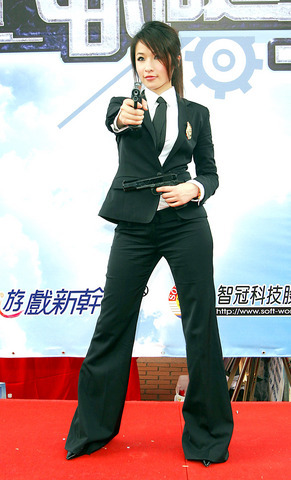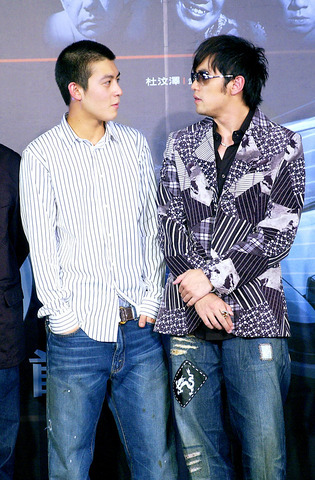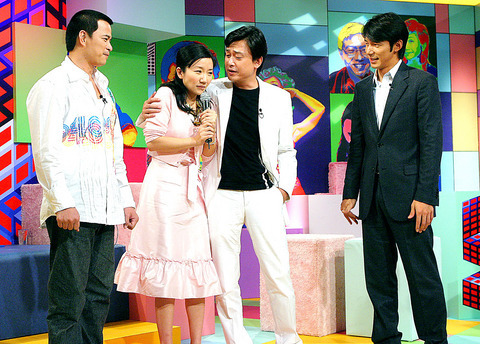Starring Jay Chou (周杰倫) and teen-idols Edison Chen (陳冠希) and Shawn Yue (余文樂) from Hong Kong, the most talked-about Chinese movie of the year, Initial D (頭文字D), finally hit the big screen last Friday in Taiwan. With a string of terrible reviews because of the poor acting of its protagonist, the movie nevertheless grossed over NT$7 million in ticket sales in the first half day of screenings.
No surprises there. A blockbuster movie is never about good-quality performances and intelligent story-telling. It's all about grand promotions, well-plotted publicity stunts and behind-the-scene stories that the press can happily chew on for weeks.
The three young male idols

PHOTO: TAIPEI TIMES
involved know all the tricks. And like their female counterparts, they understand the importance of lavish outfits and accessories. Showing up at their press conference in Taipei, Shawn smiled confidently with his NT$160,000 necklace (almost invisible to the untrained eye) and Edison strutted out of the car in a pair of Adidas sneakers worth NT$40,000. As for Jay, he didn't need to try hard -- or even try at all -- with the title King of Mando-pop under his belt.
It hasn't all been smooth sailing, though. Bad-boy Edison reportedly got pissed off by Chou's steeply rising star and felt frustrated enough about being ignored by the media during promotional tours to make a noise about it.
Petty break-up news from the self-absorbed celebrity circle is as follows: Following the break-ups of Big S (大S) and Lan Zheng-long (藍正龍), Elva Hsiao (

PHOTO: TAIPEI TIMES
TV hostess Momoko Tao (陶子), on the other hand, happily showed off her two-year relationship with actor Lee Lee-ren (李李仁) by talking about the possibility of marriage in a promotional event on Monday. As an ordinary-looking woman, Tao admitted she once wanted to get her whole body revamped with plastic surgery, but said, as reported by the Apple Daily (蘋果日報), ``on second thought, there must be a beautiful side of me -- otherwise how could I have landed such a great-looking boyfriend?''
Truth is, wealth and power can can get most people (male or female) what they want and they don't have to be good-looking to get it.
Although she's one of the least-favored movie stars in the eyes of the Chinese press, Zhang Zi-yi (章子怡) has been gaining increasing popularity and recognition in the West. She has recently been honored by becoming a member of the Academy of Motion Picture Arts and Sciences, and she's so hot there that the big-hearted Chinese media have accused her of being a snob who's forgotten where she came from and who doesn't give a shit about Chinese-speaking markets.

PHOTO: TAIPEI TIMES
Hong Kong beauty Maggie Q is another Asian actress who's made it to Hollywood. According to the Great Daily News (
The four-piece boy band F4 is going to have a girl version soon, according to the local media. But while the boy band uses pretty faces as their selling point, the F4 girls will take pride in their voluptuous breasts -- that is, all four band members are required to have F-cup equipment. The band has already recruited three big-bosomed babes, all college girls. If you want to join the band and have the right stuff, hurry to get your application form in. This is your chance to be counted and join "Fantasy 4."

This is the year that the demographic crisis will begin to impact people’s lives. This will create pressures on treatment and hiring of foreigners. Regardless of whatever technological breakthroughs happen, the real value will come from digesting and productively applying existing technologies in new and creative ways. INTRODUCING BASIC SERVICES BREAKDOWNS At some point soon, we will begin to witness a breakdown in basic services. Initially, it will be limited and sporadic, but the frequency and newsworthiness of the incidents will only continue to accelerate dramatically in the coming years. Here in central Taiwan, many basic services are severely understaffed, and

Jan. 5 to Jan. 11 Of the more than 3,000km of sugar railway that once criss-crossed central and southern Taiwan, just 16.1km remain in operation today. By the time Dafydd Fell began photographing the network in earnest in 1994, it was already well past its heyday. The system had been significantly cut back, leaving behind abandoned stations, rusting rolling stock and crumbling facilities. This reduction continued during the five years of his documentation, adding urgency to his task. As passenger services had already ceased by then, Fell had to wait for the sugarcane harvest season each year, which typically ran from

It is a soulful folk song, filled with feeling and history: A love-stricken young man tells God about his hopes and dreams of happiness. Generations of Uighurs, the Turkic ethnic minority in China’s Xinjiang region, have played it at parties and weddings. But today, if they download it, play it or share it online, they risk ending up in prison. Besh pede, a popular Uighur folk ballad, is among dozens of Uighur-language songs that have been deemed “problematic” by Xinjiang authorities, according to a recording of a meeting held by police and other local officials in the historic city of Kashgar in

It’s a good thing that 2025 is over. Yes, I fully expect we will look back on the year with nostalgia, once we have experienced this year and 2027. Traditionally at New Years much discourse is devoted to discussing what happened the previous year. Let’s have a look at what didn’t happen. Many bad things did not happen. The People’s Republic of China (PRC) did not attack Taiwan. We didn’t have a massive, destructive earthquake or drought. We didn’t have a major human pandemic. No widespread unemployment or other destructive social events. Nothing serious was done about Taiwan’s swelling birth rate catastrophe.